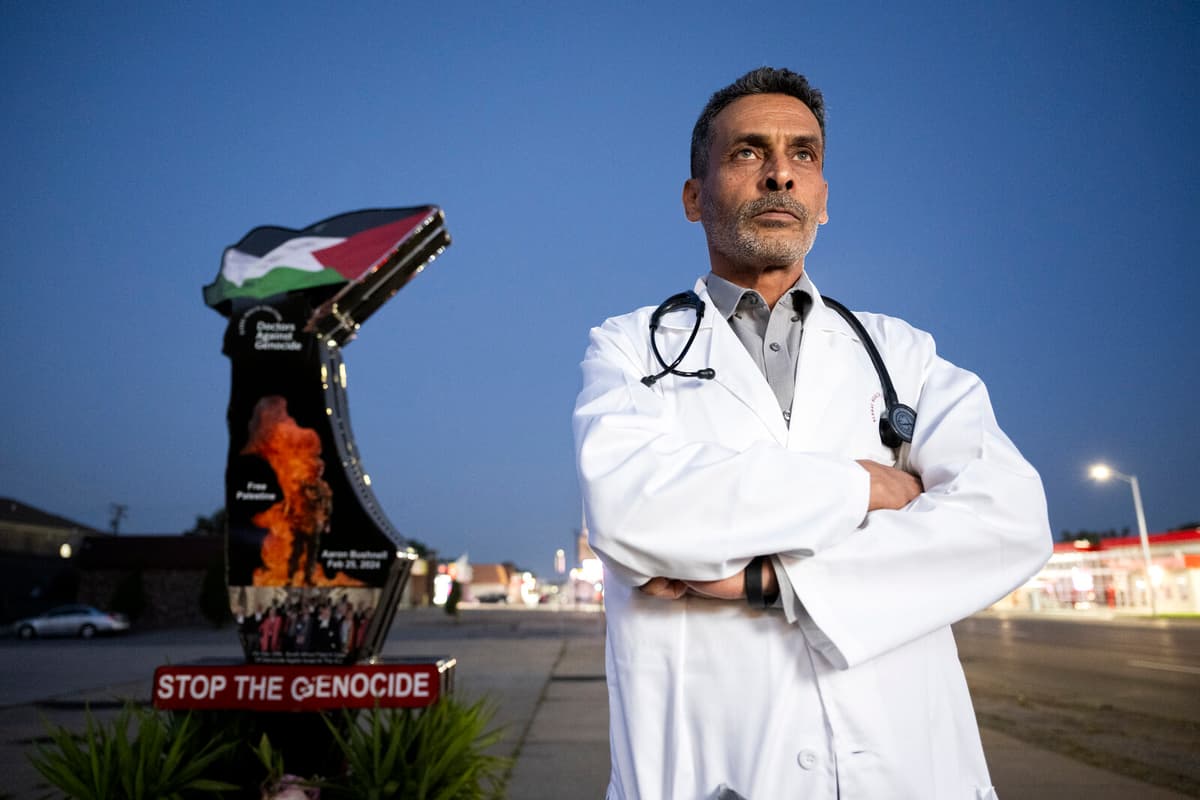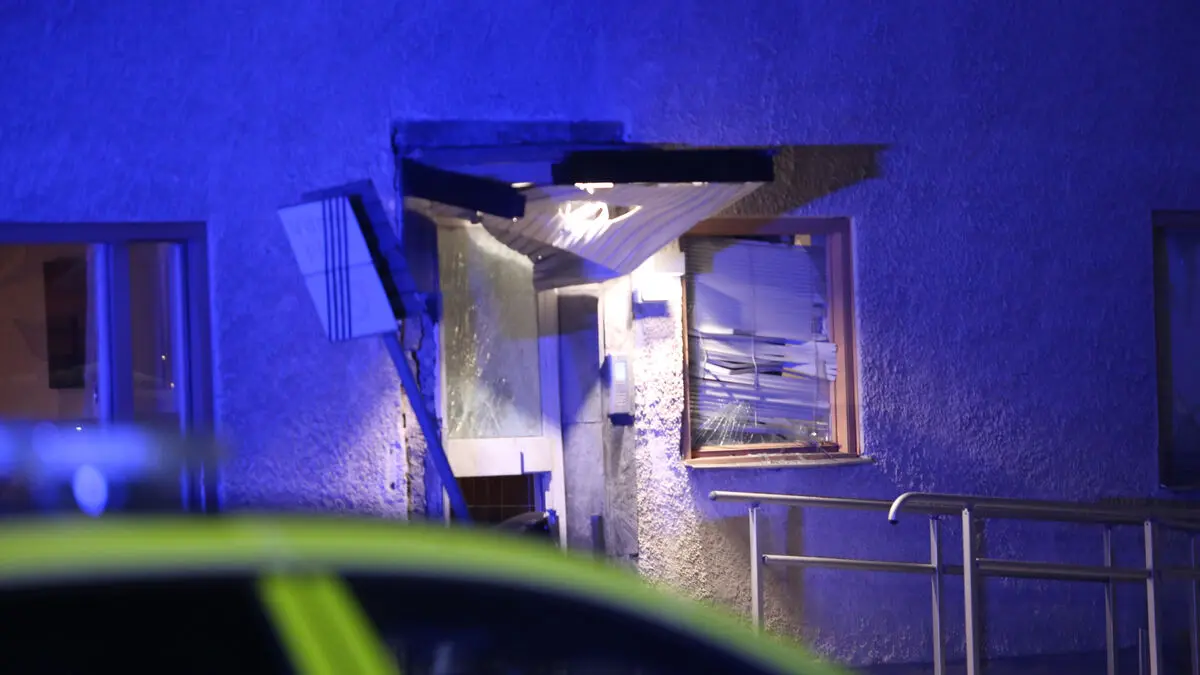Outside the reception at the multi-lane main street in East Dearborn, Nidal Jboor has created a kind of monument. It features, among other things, an image of an American soldier setting himself on fire in protest against the Gaza War. At the top is a Palestinian flag, and across the middle runs the text "Stop the genocide", which is the term Jboor uses to describe what is happening in Gaza.
Both I and my patients have difficulty sleeping, worrying, and depression. It's easy to lose faith in humanity when you witness what's happening, says the doctor, who specializes in internal medicine.
Wrote on the wall
The clinic is located in the city that is home to one of the largest populations of Arab origin in the USA. Consequently, almost all of Jboor's patients have a personal connection to the wars in the Middle East, where Israel has attacked terrorist-stamped Hamas and Hezbollah, but where many thousands of civilians have also been killed.
He himself was born in a village south of Hebron on the West Bank, where his family still lives. He is in close contact with relatives who live under Israeli occupation. In Gaza, including at al-Shifa Hospital, several of Jboor's friends from medical school in Jordan and medical students he has mentored have worked. Al-Shifa has been the subject of evacuation orders and several Israeli raids in the past year, with Israel claiming that the extremist organization Hamas has used the facility to "conduct and promote terrorist activities".
My friends have been taken prisoner or found in mass graves. I knew some of the intensive care doctors who stayed with their patients until the end, when the hospital was attacked last spring. "We did everything we could," they wrote on the wall of the department.
The world collapsed
Over the past year, Jboor has become afraid of the phone's messages. He tells about a Palestinian friend, a cardiologist working in Washington DC, who performed a procedure on a patient who had a heart attack. When the cardiologist came out of the treatment room, he was told that 80 members of his family had been killed in a rocket attack on a multi-story building in Gaza.
His world collapsed while he was saving lives. That's what we doctors do.
It was precisely the medical ethics that once led Nidal Jboor to study medicine. His original plan was to work back home in the West Bank, but the specialist training in the USA attracted him. When he was finished, the Palestinian uprising known as the second intifada had begun, and he had formed a family in the USA. In his heart, he still plans to move home, but the years have turned into decades.
Founded a group
But he is often back in the region, and in recent years, he has become increasingly worried about the development there. This led him to found Doctors Against Genocide, together with a colleague in Boston, a few years ago. The organization saw the light of day before Hamas' massive terror attack against Israel on October 7 last year.
When we started reading about genocide, we saw that the early signs were there too in Gaza: the stigmatization and dehumanization of a people, how people were herded into ghettos. All that was needed was a spark, he claims.
Before the Gaza War, Nidal Jboor was a member of a peace group with Palestinians and Israelis working for a two-state solution. He describes himself as secular, a person who has always been opposed to Hamas, and he emphasizes that all violence is evil. But he says he also understands the frustration of the population in Gaza, especially the older ones.
A precedent?
Through Doctors Against Genocide, which has gathered thousands of members in the USA, the doctor is now trying to inform the public and the rulers in Congress about the development in the region and about genocide. But he finds the task frustrating.
Many appreciate that we speak out. But we see no "action" from the members of Congress, they make no decisions. We are all complicit in the killing of so many civilians, he says, looking away.
This is not about Muslims and Jews, but about human rights. Children are being killed. The Gaza War risks becoming a terrible precedent for humanity.
Shadows Biden
What does he want to see from the US government, then? Like many Americans with roots in the Arab world, Jboor is fundamentally a Democrat. But he strongly opposes the White House's military support to Israel.
If Kamala Harris doesn't make a radical change, she doesn't deserve our support, he says about the upcoming presidential election.
Such a change would ideally consist of both a negotiated ceasefire and an arms embargo against Israel.
The current situation is overshadowing Joe Biden's legacy. History will not forget his actions, says Jboor.
The opinion is shared by almost all Americans of Arab origin that TT meets in Dearborn. And since the city is located in the swing state of Michigan, their stance could become domestically politically significant. If a large proportion of Democratic voters turn their backs on the party, Kamala Harris risks losing the state, which could tip the entire election result.
It was in Michigan that the grassroots movement Uncommitted was founded during the primary election campaign last spring, when over 100,000 Democrats actively struck Joe Biden's name in protest against the US support for Israel in the Gaza War. How these voters will vote on November 5, whether they will go to the Republicans' Donald Trump, vote blank, or stay in the Democratic camp, is unclear.
Anxiety awaits
In the midst of the election campaign, sick patients, and social media whose war flow never ceases, Nidal Jboor is careful to ensure that his children have as normal a life as possible, with school and activities. But he and his wife, who are also Palestinians, cannot take care of themselves as well.
We're running on adrenaline now. But I know that phases of anxiety await.
The 15 electoral vote-heavy Michigan is one of seven so-called swing states in the USA, places where the outcome is uncertain between Republican and Democratic majorities. Since the result is predictable in the other states, it is here that the presidential election on November 5 will be decided.
Together with Pennsylvania and Wisconsin, Michigan forms what is called the "blue firewall", which is considered crucial for a Democratic victory in the presidential election.
In 2016, Republican Donald Trump won over Democrat Hillary Clinton in Michigan by just 10,700 votes. In 2020, Democrat Joe Biden defeated Trump by 154,000 votes. In the populous county of Wayne County, where Dearborn is located, it was very close.
According to a survey published by the Arab American Institute in May, the Democrats have lost at least 90,000 votes in Michigan, mainly voters who are critical of the White House's support for Israel in the Middle East wars.
In the spring, Trump had the lead in Michigan. After Joe Biden's withdrawal in the summer, support for the party's current presidential candidate, Vice President Kamala Harris, has increased. She is now leading Trump in the state by an average of 0.7 percentage points.
Sources: AP and Real Clear Politics






